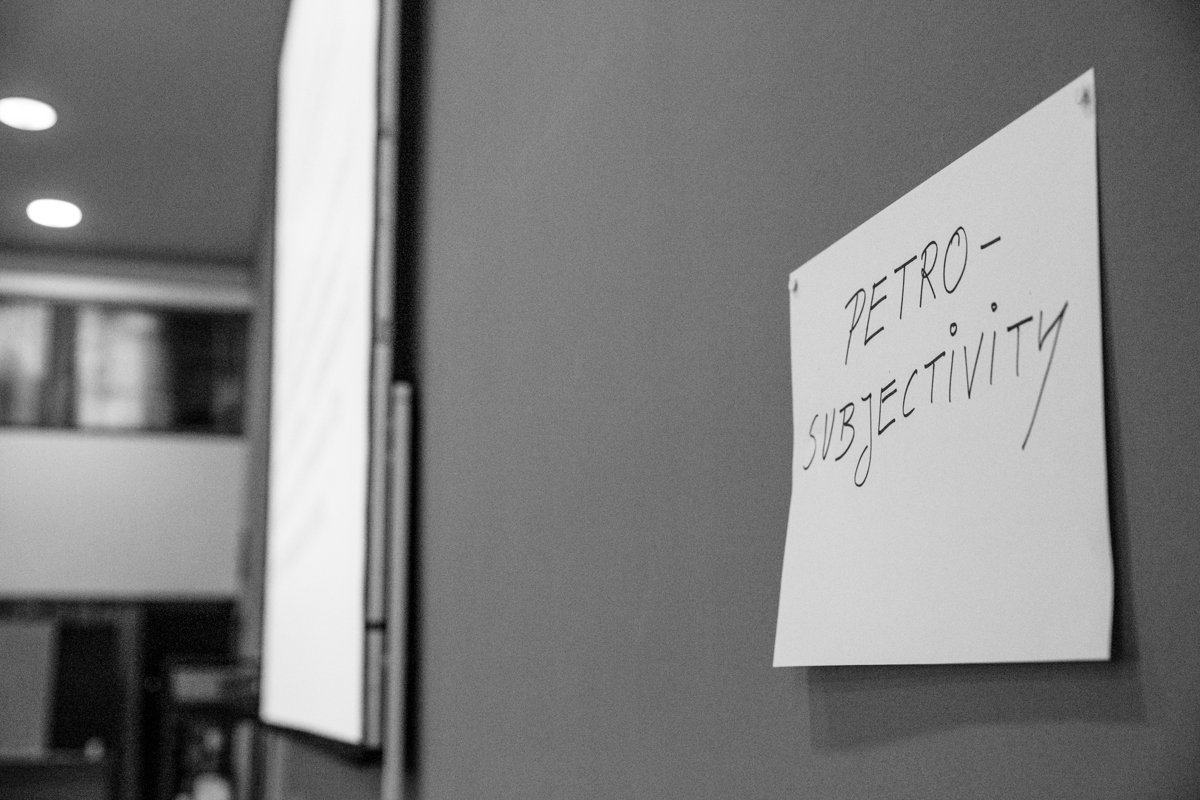Petrosens-i-a-bility
PETRO-(IN)SENSIBILITY: (in)comprehension of depths, temporalities, and/or space-times of petroleum.
PETRO-(IN)SENSABILITY: (in)ability to embody the subject-position or object-position of petroleum.
Petro-Sensability [as in sensing oil]
The ability to sense—see, hear, feel, intuit, imagine—the existence, productivity, contribution, and constitutive role of petroleum in the lifeworld of a being or thing, which hence constitutes subjectivity.
Petro-Sensability [as in sensing through oil]
Refers to the multiple ways in which oil enables, facilitates, shapes, and constrains a being’s ability to sense (perceive) its environment. This includes oil’s role in all forms of sensing technologies: for example, producing machines (e.g. cameras), generating power to produce sound, record film, share images and sensations via the Internet, printed books, projections … In short, how petroleum constructs our senses.
Petro-sensibility [as in the sense of petroleum]
Petroleum is a viscosity. A dark, thick distillation of mosses, bones, bodies, and beings condensed over time together. Its collected rivers and imperceptible sludges must be scoured with special instrumentation. What is the anticipation it developed over time? Did it expect to be discovered, extracted, expended so violently—in such a relative instant? What if the oil doesn’t want to be found?
What if it desperately wanted to escape its earthly hiding place? Waiting, hoping, impatiently to be brought forth by unwitting humans, allowing it to play out its destined role to change the planet forever, escaping human control, pervading Earth’s atmosphere, oceans, bodies, beings, things and non-things … (Human’s as the involuntary support-act for the all-powerful viscosity that knows no bounds …)
Directions
Invite the audience to gather in a circle on the floor, in close proximity to one another. In the center of the circle sits a performer, who dips their fingers into tubs of petroleum jelly and carefully lays a thick coat of it over the red skin of apples. The performer hands the apples to the audience seated around them, signaling that the apples should be circulated from one person to another. Meanwhile, a sonic track plays, mixed from field recordings of oil derricks in operation. Five other performers circle the audience in alternate directions, reciting in an improvised rhythm from selected texts related to the materiality and subjectivity of petroleum. Selected texts include a long list of selected everyday products that are made with petroleum; an excerpt from The Dark Mountain Manifesto by Dougald Hine and Paul Kingsnorth; excerpts from Cyclonopedia by Reza Negarestani; and “Petrosense and Petroinsensibility” (a treated public-domain re-imagining of Jane Austen’s classic). The duration of the event is as desired, or 5‒8 minutes.
Petrosense and Petrosensibility (excerpts)
by Angela Rawlings
Co-opted (upcycled? adapted?) text from a public-domain Industrial Revolution-era British novel
CHAPTER 3
Statoil remained in Norway several months; not from any disinclination to move when the sight of every well known drilling spot ceased to raise the violent emotion which it produced for a while; for when the corporation’s spirits began to revive, and it became capable of some other exertion than that of heightening its affliction by melancholy remembrances of an oil boom that was, Statoil was impatient to be gone, and indefatigable in its inquiries for a suitable dwelling in the ocean surrounding Norway; for to remove far from that beloved spot was impossible. But Statoil could hear of no situation that at once answered its notions of comfort and ease, and suited the prudence of its eldest stakeholders, whose steadier judgment rejected several exploratory fields as too deep for their pockets.
CHAPTER 10
Marianne began now to perceive that the desperation which had seized her, of ever seeing an energy source that could satisfy her ideas of sustainability, had been rash and unjustifiable. Fossil fuel was all that her fancy had delineated in that unhappy hour and in every brighter period, as capable of attaching her; and its utility declared her wishes that the substance be in that respect as sustainable, as its abilities were strong. Statoil too, in whose mind not one speculative thought of its sustainability had been raised, by prospects of riches, was led before the end of a week to hope and expect it; and secretly to congratulate itself on having gained such wealth.
CHAPTER 22
Marianne, who had never much toleration for any thing like impertinence, vulgarity, inferiority of parts, or even difference of taste from herself, was at this time particularly ill-disposed, from the state of Anthropocenic aesthetics.
CHAPTER 36
They had too much sense to be desirable companion species to the former; and by the latter they were considered with a jealous eye, as intruding on THEIR ground, and sharing the kindness which they wanted to monopolise. Though nothing could be more polite than humanity’s behaviour to crude oil, humanity did not really like oil at all. Because oil neither flattered humans nor their children, humans could not believe oil good-natured; and because humans were fond of reading, humans fancied oil satirical: perhaps without exactly knowing what it was to be satirical; but THAT did not signify. It was censure in common use, and easily given.
CHAPTER 43
Never in her life had Elinor found it so difficult to be calm, as at that moment. The knowledge of what companion species must be feeling about the tar sands—of doubt— dread—perhaps despair!—and of what THEY might have to tell!—with such knowledge it was impossible to be calm. All that remained to be done was to be speedy; and, therefore she hurried out of the Anthropocene.

